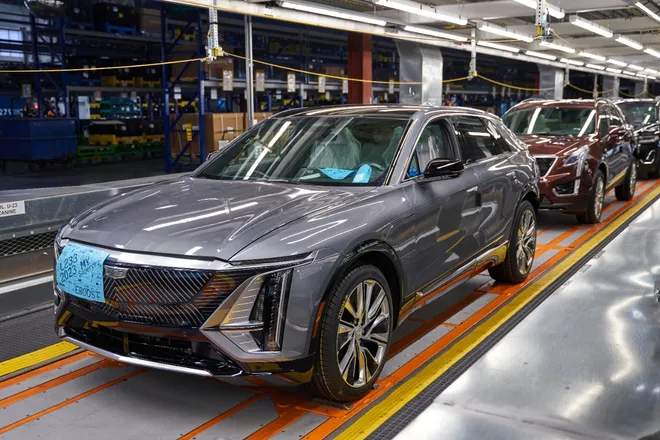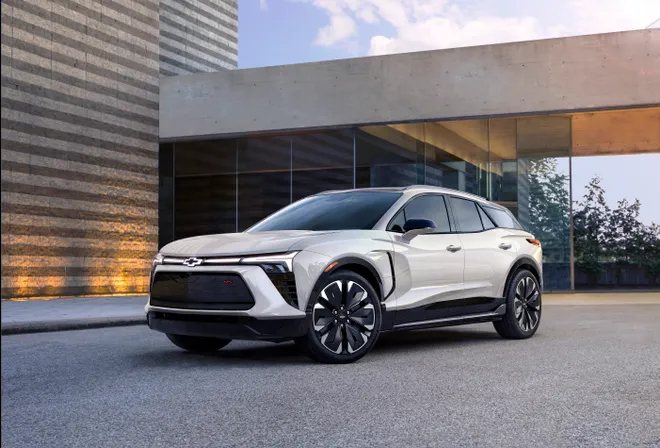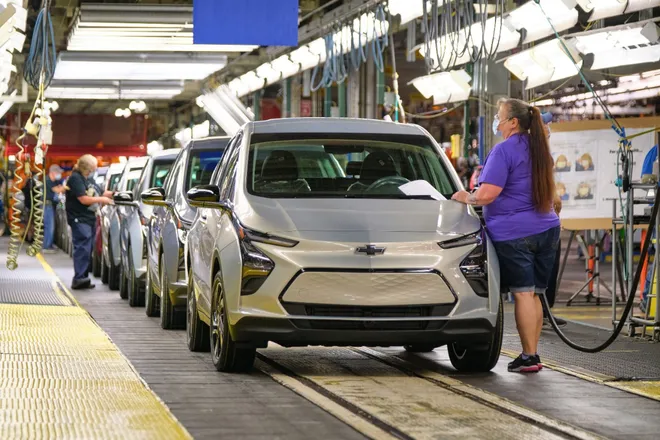Select EVs kicked off tax credit list in 2024 will be discounted $7,500 by General Motors
General Motors said it will make sure its new electric vehicles remain price competitive even as new rules from U.S. Treasury disqualify some of the carmakers' electric vehicles for the $7,500 consumer tax credit this year.
The new rules prevent allowing the credit on vehicles made with components that come from companies tied to the governments of China, Iran, North Korea or Russia, as the Detroit Free Press, part of the USA TODAY Network, reported last month. This stipulation is making it harder for EVs to qualify for the tax credit.
GM confirmed to the Detroit Free Press on Tuesday that the automaker will provide consumers with $7,500 off the price of any of the EVs that are ineligible for the government's credits under the new rules until GM can source the components from places that make the car eligible again for the tax credit.

This comes after Treasury revealed earlier this week that some EVs made by Ford Motor Co., GM and many of their competitors will no longer qualify for consumer tax credits.
The upside to all this is: This is the first year that consumers will get the tax credit at the point of purchase instead of having to wait to file for credit on tax returns.
Which GM cars no longer qualify for the EV tax credit?
At GM, the affected EVs that will lose the $7,500 tax credit are the Chevrolet Blazer EV and the Cadillac Lyriq.
GM spokeswoman Liz Winter said in a statement that after GM reviewed Treasury's proposed guidance, "The Cadillac Lyriq and Chevrolet Blazer EV will temporarily lose eligibility for the clean vehicle credit on Jan. 1, 2024 because of two minor components. While we await final rules, GM has pulled ahead sourcing plans for qualifying components in early 2024 and will advocate for our dealers and customers who purchase vehicles built ahead of the new guidance."
On Wednesday, Ford Motor Co. said it was pleased that F-150 Lightning buyers will get the tax credit for both standard and extended ranges. Since the Mustang Mach-E is no longer eligible for the federal tax incentive, Ford spokesman Marty Gunsberg told the Free Press the automaker expects to see more leasing customers, who will receive a $7,500 price break.
Cars that qualify for the EV tax credit:See the updated list for 2024
"We are making adjustments to pricing, production and trim packages to achieve the optimal mix of sales growth, profitability and customer access to the IRA (Inflation Reduction Act) tax benefit," Gunsberg said.
EV sales leader Tesla said on its website that its new Cybertruck "is likely to qualify for the federal tax credit later in 2024."
Look for more leases
The biggest impact from these changes will be a spike in the number of leases. Leases have a tax break loophole, said Sam Abuelsamid, principal analyst for E-Mobility at Guidehouse Insights in Detroit.
"All of these automakers were likely well aware that this was a possibility although some were at least hoping that IRS would provide some tolerance for minimal quantities of Chinese components, but the IRA is pretty explicit that any amount from entities countries would not qualify," he said.
"In the case of GM, while most of the content in the Ultium batteries is either domestic or from qualifying free trade partners, there apparently is some small quantities of Chinese components or materials," Abuelsamid said.
Cox Automotive analyst Stephanie Valdez Streaty said in the end, the consumer will win out.
“The changes to eligibility in 2024 for the electric vehicle tax credit will affect several popular models ‒ in fact, more models are not eligible than are eligible starting this year," Streaty told the Free Press. "As a response, the consumer will likely see even more discounts, more leasing and more creative sales pushes to help move inventory."
Cox is expecting EV leases to increase from about 20% in 2023 to 25% in 2024. Streaty said many consumers will find the new rule that provides the credit at point of purchase more appealing than having to take a future tax credit, even if it means fewer EVs qualify for it at the moment.
What GM is doing about it
At GM, Winter said it told its dealers that it will "provide $7,500 for any vehicles that became ineligible on Jan. 1, 2024, as result of the new guidelines."

In a letter sent to dealers Tuesday that GM provided to the Free Press, GM said the new government guidelines that make its EVs ineligible do not apply to leases, so it encouraged dealers to "offer the ineligible inventory" to leasing customers.
Winter added that "GM is quickly transitioning so all remaining GM EVs under the MSRP (manufacturer's suggested retail price) cap will be eligible for the full incentive in early 2024," which includes the Cadillac Lyriq, the upcoming entry Optiq, the Chevrolet Blazer EV, Equinox EV, the retail Silverado pickup EV and GMC Sierra pickup EV.
The MSRP cap to qualify for the credit is $80,000 for vans, sport utility vehicles and pickup trucks and $55,000 for everything else.
Building customer 'good faith'
But the government's new guidelines are going to be costly for GM and Ford one way or another, experts said.
"GM and Ford are losing the tax credit on many critical EVs, this puts pricing pressure on the (automakers) in the form of incentives or MSRP reductions," said Ivan Drury, director of Insights at Edmunds. "The backdoor route of leasing for the tax credit is still available and while the industry is already looking at nearly half of EV transactions being a lease, the 2024 changes could ratchet the figure even higher, putting further pressure on what is already an issue for EVs, diminished residual values."
Drury said it is good to see that GM is not waiting around to see what happens and what toll the changes could take on sales, but being proactive with offering $7,500 incentives and re-sourcing parts to get its EVs on the eligible list.
If GM can "get the messaging out quickly and strongly, it will be a win in terms of building good faith with customers and cutting out confusion," Drury said.
The Chevrolet Bolt and Bolt EUV still qualify for the $7,500 tax break. GM ended production of the Bolt EVs at Orion Assembly last month, but Chevrolet executives have said there will be enough in supply to sell through February. GM plans to launch a next-generation, Ultium-based Bolt which will arrive at dealerships in 2025, CEO Mary Barra has said.

GM's Winter said the Chevrolet Silverado EV work truck is a fleet purchase that still qualifies for the commercial tax credit. The retail version of the Silverado EV should be available later this year "after our sourcing change is in place," so it will also qualify if the trim's sticker price is under $80,000. If consumers are interested in a GM EV, the automaker has set up www.evlive.gm.com where consumers can plug in a VIN to see whether a vehicle qualifies.
The Treasury said it expects its list of which EVs qualify for a credit to change because some carmakers have not yet submitted information on eligible vehicles. Also, it said automakers are "adjusting their supply chains" to ensure buyers continue to be eligible for the credit, "partnering with allies and bringing jobs and investment back to the United States."
In the meantime, watch for automakers to react to market demand.
"If the models are high enough volume to help their bottom lines, plans should be in place to regain those incentives in the mid-term when local battery plants come on line," said Sam Fiorani, vice president of Global Vehicle Forecasting at AutoForecast Solutions. "Until that happens, market forces will push the automakers to lower their retail prices, probably through incentives rather than actually changing the sticker price, and build a limited number of the models as loss-leaders for the rest of the lineup. Since the incentives allow the automakers to keep the prices of EVs artificially high, automakers profit from the federal money and not the buyers."
Contact Jamie L. LaReau: jlareau@freepress.com. Follow her on Twitter @jlareauan.
Disclaimer: The copyright of this article belongs to the original author. Reposting this article is solely for the purpose of information dissemination and does not constitute any investment advice. If there is any infringement, please contact us immediately. We will make corrections or deletions as necessary. Thank you.







